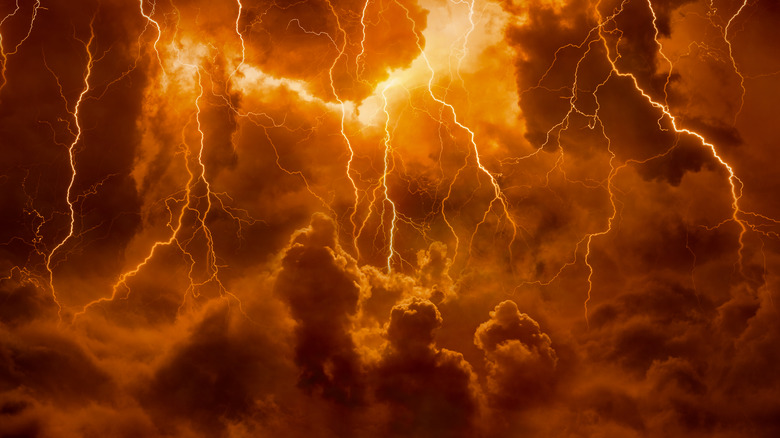The Truth About Baba Vanga, The 'Nostradamus Of The Balkans'
Do the words "blind Bulgarian mystic named Baba Vanga who prophesied the end of the world" tickle your imagination? You're not alone. If you are among the living (and the literate) — unlike those headed for doom and torment, vis-à-vis Baba Vanga's prognostications — then strap in for a fun, slightly tabloidy recount of the visions and exploits of the "Nostradamus of the Balkans."
Nostradamus, you may recall, was that French guy with the big, funny, black hat who keeps getting his one book of future predictions, "The Centuries," dragged out for the interpretations, reinterpretations, provocations, endless speculations, all that, of countless online videos and articles. To be fair, as History explains, Michel de Nostradame did study medicine in 1522 at the University of Montpelier before turning to bowls full of herbs and water to perceive the future. On Nostradamus' docket for 2021, as the New York Post states? Foot shortages, asteroids, and zombies. Or put otherwise, "The Great Mover renews the ages / Rain, blood, milk, famine, steel, and plague."
So what did Baba Vanga say about 2021? As Mirror says, we've got the EU collapsing, an assassination attempt on Vladimir Putin, Islamic extremists in Europe, people divided by faith, changes in consciousness, and oh, sunlight-powered, flying trains. Also, Donald Trump will contract a "mysterious disease that will leave him deaf, and cause brain trauma."
A local clairvoyant who prophesized numerous modern events
Baba Vanga was born Vanghelia Pandeva Dimitrova in 1911 in Bulgaria and, as History of Yesterday says, spent most of her life in Rupite area in the Kozhuh Mountains, about two hours north of Thessaloniki, Greece. She passed away in 1996 at the age of 85, and four years later word of her prophecies started to spread, as Newsweek says, when the Russian nuclear submarine Kursk sank. Baba Vanga, it seems, predicted it in 1980. When Baba Vanga was alive, locals grew to believe that she had paranormal powers, and used to visit her to speak with dead relatives. This is when she got her nickname, a combination of "baba" (old lady) and "vanga" (an abbreviation of her first name).
Baba Vanga wasn't born blind, but by all accounts lost her sight in a freak accident in childhood. In 1925, she attended a school for the blind in Zemun, where she learned Braille. Unlike Nostradamus, though, she didn't write any of her visions down. She relied on those around her to communicate what she saw, which she attributed to "invisible creatures" she couldn't explain.
Yet, folks have determined that Baba Vanga's predictions, however they might be interpreted, have proven roughly 85% accurate. Among other things, she apparently foretold the onset of World War II, Stalin's death, Chernobyl, the 9/11 World Trade Center attacks, the 2011 Fukushima nuclear disaster in Japan, Barrack Obama becoming president, and the exact day of her own death.
Prophecies of destruction, transformation, cyborgs, and aliens
Other predictions of Baba Vanga revolve around themes similar to all prophecies: destruction, transformation, words of caution about world powers, environmental disasters, and so on. She, like the Book of Revelations in the Bible, talked about "dragons," which many believe to be a comment on the ever-rising geopolitical power of China, especially given her concurrent prophecies about "red money" (per Mirror). As History of Yesterday says, she also said that cloning will be commonplace by 2046, nature will be reborn in 2084, humans will undergo cyborgification in 2111, there will be time travel and alien contact around 2288, there will be war on Mars in 3005, and no more life on Earth by 3797.
It wasn't all about doom and gloom, though. Baba Vanga did also say that 2021 would be the year that cancer was cured. At the very least, this can serve as a reminder of hope that cancer, in all of its destructive types and permutations, will indeed someday have a cure.
In this way, it's the vagueness of prophetic visions that make them so intriguing (aside from the whole "impossible magic" aspect). They reveal the obsessions of the era, and the preoccupations of those who interpret them. In this way, Baba Vanga and others like her prove valuable not necessarily because they confer the ability to prepare for major world events, but because of their ability to actually "predict," in an indirect way, whatever people want to believe.


